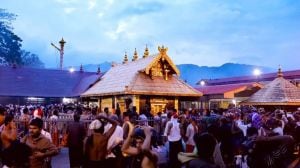Time Out 8212; Tryst with corruption
As the country waits with bated breath to listen to Prime Minister I K Gujral's swarna jayanti Independence Day address, here's a possible ...

As the country waits with bated breath to listen to Prime Minister I K Gujral8217;s swarna jayanti Independence Day address, here8217;s a possible script for a suitable speech. It has, in my humble opinion, the necessary contemporary relevance and the required historical resonance. It also has the virtue of being familiar to the ear of almost every Indian. While acknowledgements to Jawaharlal Nehru8217;s original speech, delivered on the midnight of August 14, 1947, must be duly made, any additions, subtractions, deductions and conclusions are entirely the responsibility of the author8217;s. Of course, ultimately, it is up to the Prime Minister to accept or reject this speech, but he should not dismiss it without giving it due consideration. I may clarify that this is not intended to cast aspersions on the integrity of our politicians and bureaucrats, but only to celebrate their 50 years of freedom.
Long years ago we made a tryst with corruption, and now the time comes when we shall redeem our pledge, not wholly or in full measure, but very substantially.
At the stroke of midnight hour, when the world sleeps, India will awake to life and corruption. A moment comes which comes but rarely in history, when we step out from old corruptions to new ones, when an age ends and when the soul of a nation, long suppressed, finds utterance in corruption. It is fitting that at this solemn moment we take the pledge of dedication to Indian corruption and to the still larger cause of more corruption.
At the dawn of history India started on her unending quest of corruption, and trackless centuries are filled with her striving and the grandeur of her successes and her failures in corruption. Through good and ill fortune alike she has never lost sight of that quest or forgotten the ideals which gave her strength. We end today a period of ill fortune and India discovers herself again in corruption.
The achievement we celebrate today is but a step, an opening of opportunity to greater triumphs and corruptions that await us. Are we brave enough and wise enough to grasp this opportunity and accept the challenge of a corrupt future?
Freedom and corruption bring responsibility. That responsibility rests upon this assembly, a sovereign body representing the sovereign people of India. Before the birth of corruption we have endured all the pains of labour and our hearts are heavy with the memory of this sorrow. Some of those pains continue even now.
Nevertheless, the past is over, and it is the future in corruption that beckons to us now.
That future is not one of ease or resting but of incessant corruption, so that we might fulfil the pledges we have so often taken. The service of India means the service of ourselves. It means the ending of our personal poverty, and ignorance and disease and inequality of opportunity to be corrupt. The ambition of the greatest man of our generation has been to wipe every tear from every eye. That is beyond us but so long as there are inadequate avenues for corruption so long our work will not be over.
And so we have to labour and to work, work hard at corruption, to give reality to our dreams. Those dreams are for India, but they are for all the peoples too closely knit together today by corruption for any of them to imagine that they can live apart from corruption. Peace has been said to be indivisible, so is freedom, so is prosperity now, and so also is corruption in this one world that can no longer be split into isolated fragments.
To the people of India whose representatives we are, we make appeal to join us with faith in this great adventure of corruption. This is no time for petty and destructive criticism, no time for ill-will or blaming others. We have to build the noble mansion of corrupt India, where all her children may dwell.
- 01
- 02
- 03
- 04
- 05































